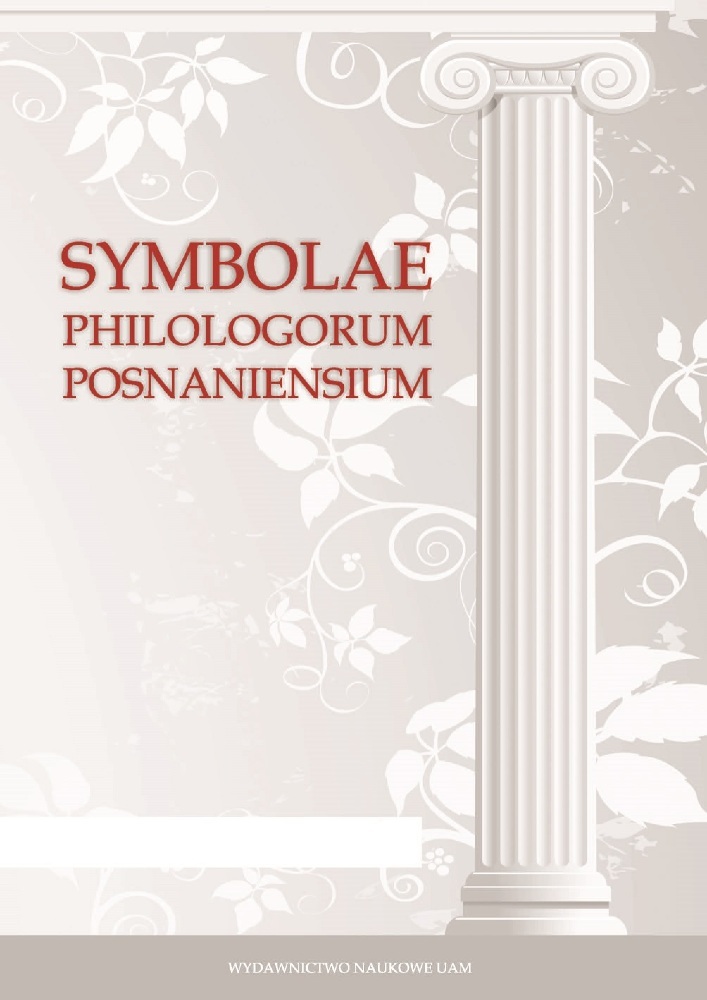Abstract
The following article deals with a possibility of finding some parallels between oratory art and staging. They are often hidden in a text structure, but also an old practice allows us to point many similarities between both arts. Some ancient, medieval treatises were chosen for the further analysis.Literaturhinweise
Primary Sources
Anonimus 1952: Anonim tzw. Gall, Kronika czyli dzieje książąt i władców polskich, K. Maleczyński (ed.), Kraków 1952 (MPH, s.n., t. 2).
Brewiarz 1963: Brewiarz miłości. Antologia liryki staroprowansalskiej, oprac. Z. Romanowiczowa, Wrocław – Warszawa – Kraków 1963.
Cicero 1896: Marcus Tullius Cicero, De officis libri tres; für den Schulgebrauch, ed T. Schiche, Leipzig 18962.
Cicero 1967: Marcus Tullius Cicero, De l’Orateur, ed. E. Courbaud, Paris 19676.
Cicero 1980: Marcus Tullius Cicero, Orator, ed. R. Westman, Leipzig 1980.
Quintilianus 1970: Marcus Fabius Quintilianus, Institutionis oratoriae libri duodecim, t. 1–2,
recogn. brevique adnotatione critica instruxit M. Winterbottom, Oxford 1970 (reprinted 2005).
Butler: [An English translation by] H.E. Butler http://penelope.uchicago.edu/Thayer/E/Roman/
Texts/Quintilian/Institutio_Oratoria/home.html
Parisiana Poetria 1974: Johannes de Garlandia, The Parisiana Poetria of John of Garland, ed. With Introduction, transl., and notes by T. Lawler, New Haven – London 1974.
Rhet. Herr. 1964: Ad C. Herennium de ratione dicendi (Rhetorica ad Herennium), H. Caplan (ed.), London – Cambridge (Mass.) 1964.
Secondary sources
Balme 2002: Ch. Balme, Wprowadzenie do nauki o teatrze, Warszawa 2002 (Original title: Einführung in die Theaterwissenschaft, Berlin 20012).
Banaszkiewicz 2008: J. Banaszkiewicz, Gall jako historyk poważny, czyli dlaczego dzieje i Bolesława Chrobrego, i Bolesława Krzywoustego są prawdziwe i niegroteskowe, Przegląd Historyczny, 99 (2008), z. 3, 399–410.
Bec 1986: P. Bec, Troubadours, trouvèrs et espace Plantagenêt, Cahiers de civilisation médiévale Xe-XIIe siècles, 29 (1986), 9–14.
Bieber 1961: M. Bieber, The History of the Greek and Roman Theater, Princeton 1961.
Bonner 1949: S. F. Bonner, Roman Declamation in the Late Republic and Early Empire, Berkeley – Los Angeles 1949.
Brogi-Bercoff 1985: G. Brogi-Bercoff, «Teatralność» dziejopisarstwa renesansu i baroku, in: Publiczność
literacka i teatralna w dawnej Polsce, H. Dziechcińska (ed.), Warszawa – Łódź 1985, 187–203.
Brogi-Bercoff 1998: G. Brogi-Bercoff, Królewstwo Słowian. Historiografia renesansu i baroku w krajach słowiańskich, Izabelin 1998.
Dąbrówka 2004: A. Dąbrówka, Deklamacja w średniowiecznej teorii retorycznej i praktyce szkolnej, in: Problematyka tekstu głosowo interpretowanego, red. K. Lange, W. Sawrycki, P. Tański, Toruń 2004, 245–261.
Gacka 2011: D. Gacka, Elementy teatralne w XII- i XIII-wiecznych poetykach – rekonesans, in: Pogranicza teatralności, pod red. A. Dąbrówki, Warszawa 2011, 51–74.
Gaunt-Marshall 2005: S. Gaunt, J. Marshall, Occitan grammars and the art of troubadour poetry, in: The Cambridge History of Literary Criticism, t. 2, A. Minnis, I. Johnson (ed.), Cambridge 2005, 472–495.
Gindin 1990: S.I. Gindin, Byla li ritorika ‘donaučnoj’ teorej teksta, in: Tekst w kontekście, pod red. T. Dobrzyńskiej, Wrocław 1990, 7–32.
Glińska 2011A: K.A. Glińska, Między retoryką a teatrem. Teatralność komedii elegijnej w świetle teorii starożytnych i średniowiecznych, in: Pogranicza teatralności, pod red. A. Dąbrówki, Warszawa 2011, 75–99.
Glińska 2011B: K.A. Glińska, Pronuntiatio w wykładzie sztuki poetyckiej Gotfryda de Vinsauf, in: Studia rhetorica pod red. M. Choptianego, W. Ryczka, Kraków 2011, 41–54.
Gunderson 2003: E. Gunderson, Declamation, paternity, and Roman identity authority and the rhetorical self, Cambridge – New York 2003.
Guttner-Sporzyński 2010: D. von Guttner-Sporzyński, Gallus Anonymus, in: The Encyclopedia of the Medieval Chronicle, ed. R. G. Dunphy, Leiden – Boston 2010, t. 1, 659–660.
Jasiński 2008: T. Jasiński, O pochodzeniu Galla Anonima, Kraków 2008.
Kocur 2005: M. Kocur, We władzy teatru. Aktorzy i widzowie w antycznym Rzymie, Wrocław 2005.
Kopperschmidt 1990: Rhetorik. Zwei Bände, ed. J. Kopperschmidt, t. 1, Rhetorik als Texttheorie, Darmstadt 1990.
Lichański 1992: J. Lichański, Retoryka od średniowiecza do baroku. Teoria i praktyka, Warszawa 1992.
Liman 1973: K. Liman, Kilka uwag o topice w «Kronice Polskiej» Galla Anonima, Symbolae Philologorum Posnaniensium Graecae et Latinae, 1 (1973), 147–164.
Litteraria 2008: Litteraria Copernicana, 2 (2008).
Michałowska 1998: T. Michałowska, «Wędrowiec» i «nieśmiertelna sława» Galla Anonima, in: Mediaevalia i inne, Warszawa 1998, 49–69.
Michałowska 2007: T. Michałowska, Średniowieczna teoria literatury w Polsce. Rekonesans, Wrocław 2007.
Mühle 2009: E. Mühle, Cronicae et gesta ducum sive principum Polonorum. Neue Forschungen zum so genannten Gallus Anonymus, Deutsches Archiv für Erforschung des Mittelalters, 65 (2009). H. 2, 459–496.
Nicoll 1958: A. Nicoll, The Development of the Theatre, London 19584.
Ong 2001: W. J. Ong, Orality and literacy: the technologizing of the word, London – New York 2001.
Ruta-Rutkowska 2010: K. Ruta-Rutkowska, Metateatralność, metadramatyczność, metatekstowość w dramacie, Pamiętnik Literacki, 101 (2010), 113–138.
Schmidt 2006: J. C. Schmidt, Gest w średniowiecznej Europie, Warszawa 2006 (Original title: La raison des gestes dans l’Occident médiéval, Paris 1990).
Skwara 2001: E. Skwara, Historia komedii rzymskiej, Warszawa 2001.
Świontek 1999: S. Świontek, Dialog, dramat, metateatr. Z problemów teorii tekstu dramatycznego, Warszawa 19992.
Targosz 1980: K. Targosz, Gesta principum recitata. «Teatr czynów polskich władców» Galla Anonima, Pamiętnik Teatralny, 29 (1980), z. 2 (114), 141–178.
Wenta 2011: J. Wenta, Kronika tzw. Galla Anonima. Historyczne (monastyczne i genealogiczne) oraz geograficzne konteksty powstania, Toruń 2011.
Wiesiołowski 2006: J. Wiesiołowski, Repertuar Jurzyka, jokulatora księcia Władysława Odonica, in: Wielkopolska–Polska–Europa, pod red. J. Wiesiołowskiego przy współpracy J. Kowalskiego, Poznań 2006, 59–67.
Wojtowicz 2009: W. Wojtowicz, «Memoria» i uczta. Kilka uwag o założeniach ideowych kroniki Mistrza Wincentego, in: Onus Athlanteum. Studia nad Kroniką biskupa Wincentego, pod red. A. Dąbrówki i W. Wojtowicza, Warszawa 2009, 337–347.
Wojtowicz 2013: Tarda loquendi facultas – tożsamość tzw. Galla Anonima w kontekście listów i epilogów «Gestów», Pamiętnik Literacki 104 (2013), z. 3, 5–38.
Dictionaries
Du Cange 1863: Glossarium mediae et infimae Latinitatis, ed. Du Cange, Niort 1863sqq.
Forcellini 1940: Lexicon totius Latinitatis, ed. Ae. Forcellini, Patavii 1940sqq.
Niermeyer 2001: Mediae Latinitatis lexicon minus, ed. J. F. Niermeyer, Leiden 2001.
Plezia 1998: Słownik łacińsko-polski, ed. M. Plezia, Warszawa 19982.
Lizenz
